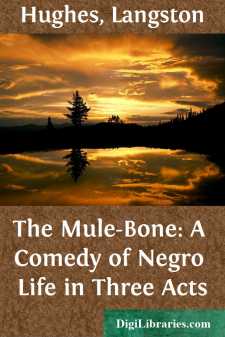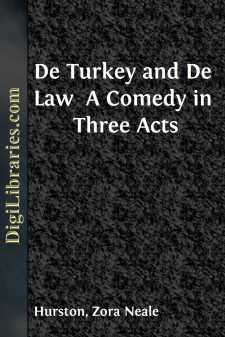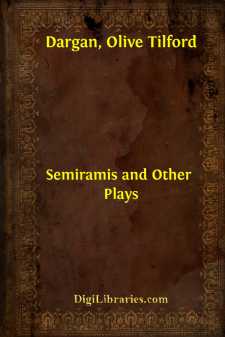Drama
General Books
Sort by:
THERE ARE CRIMES AND CRIMES INTRODUCTION Strindberg was fifty years old when he wrote "There Are Crimes and Crimes." In the same year, 1899, he produced three of his finest historical dramas: "The Saga of the Folkungs," "Gustavus Vasa," and "Eric XIV." Just before, he had finished "Advent," which he described as "A Mystery," and which was published...
more...
by:
Langston Hughes
CHARACTERS JIM WESTON: Guitarist, Methodist, slightly arrogant, agressive, somewhat self-important, ready with his tongue. DAVE CARTER: Dancer, Baptist, soft, happy-go-lucky character, slightly dumb and unable to talk rapidly and wittily. DAISY TAYLOR: Methodist, domestic servant, plump, dark and sexy, self-conscious of clothes and appeal, fickle. JOE CLARK: The Mayor, storekeeper and postmaster,...
more...
by:
Percival Wilde
THE NOBLE LORD A secluded spot in the Maine woods in the neighborhood of a summer hotel. It is the middle of July. The trees are covered with foliage, a hot sun casts dancing shadows upon the mossy ground, and the air is full of the twittering of birds and the rustle of leaves. A winding path crosses from one side to the other, and near the center is a little clearing: the stump of a felled tree, with...
more...
CAST Jim Weston A young man and the town bully (A Methodist) Dave Carter The town's best hunter and fisherman (Baptist) Joe Clarke The Mayor, Postmaster, storekeeper Daisy Blunt The town vamp Lum Boger The Marshall Walter Thomas A villager (Methodist) Lige Moseley A villager (Methodist) Joe Lindsay A villager (Baptist) Della Lewis A villager (Baptist) Tod Hambo A villager (Baptist) Lucy Taylor A...
more...
by:
Robert Garnier
Sieur du Pleßis Marly. T seemes to mee strange, and a thing much to be marueiled, that the laborer to repose himselfe hasteneth as it were the course of the Sunne: that the Mariner rowes with all force to attayne the porte, and with a ioyfull crye salutes the descryed land: that the traueiler is neuer quiet nor content till he be at the ende of his voyage: and that wee in the meane while tied in this...
more...
THE FIRST ACT At Baden, near Vienna, in 1830. The drawing-room of the villa occupied by Maria Louisa. The walls are painted al fresco in bright colors. The frieze is decorated with a design of sphinxes. At the back, between two other windows, a window reaching to the ground and forming the entrance from the garden. Beyond, the balustrade of the terrace leading into the garden; a glimpse of lindens and...
more...
ACT I. Scene: Within the tent of Menones, on the plain before Nineveh. Left, centre, entrance to tent from the plain. Curtains rear, forming partition with exits right and left of centre. The same at right, with one exit, centre. Couch rear, between exits. From a tent-pole near exit, right centre, hang helmet and a suit of chain armor. Sola parts curtains rear, left, and looks out, showing effort to...
more...
ACT V SCENE I. The Forest of Arden [Enter TOUCHSTONE and AUDREY.]TOUCHSTONEWe shall find a time, Audrey; patience, gentle Audrey. AUDREYFaith, the priest was good enough, for all the old gentleman's saying. TOUCHSTONEA most wicked Sir Oliver, Audrey, a most vile Martext. But, Audrey, there is a youth here in the forest lays claim to you. AUDREYAy, I know who 'tis: he hath no interest...
more...
by:
William Congreve
For one may apprehend the whole truth to be somewhat thus. Satiric comedy, or comedy of manners, is the art of making ludicrous in dramatic form some phase of life. The writers of our old comedy thought that certain vices—gambling, adultery, and the like—formed a phase of life which for divers reasons, essential and accidental, lent itself best to their purpose. They may, or may not, have...
more...
ACT I. I. 1 Scene I. Enter Duke, , Gaoler, , and other Attendants. Æge. Proceed, , to procure my fall, And by the doom of death end woes and all. Duke. Merchant of Syracusa, plead no more; I am not partial to infringe our laws: The enmity and discord which of late 5 Sprung from the rancorous outrage of your duke To merchants, our well-dealing countrymen, Who, wanting guilders to redeem their lives,...
more...










![The Comedies of William Congreve
Volume 1 [of 2]](https://digilibraries-com.s3.eu-central-1.amazonaws.com/covers/8dc1222e-f879-4d40-afe0-4a0d866881c1.jpg)
